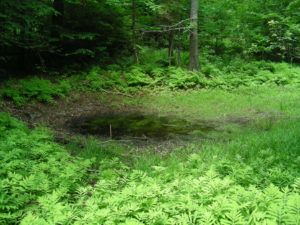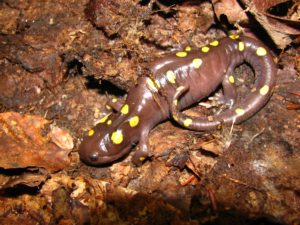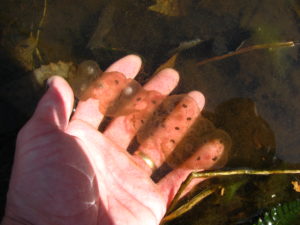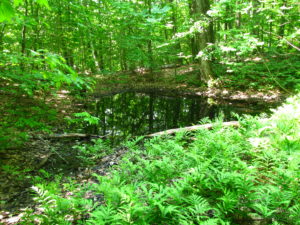Amphibians of Vermont Vernal Pools

Instructor: Kate Kelly
April 15 (9 am to 5 pm)
April 16 (9 am to 2 pm or earlier)
May 7 (9 am to 2 pm or earlier)
Course size: 12 students
$285 | Financial support available (contact us)
T
his course is an introduction to vernal pools, with a particular focus on identification and natural history of the frogs and salamanders that breed in them. Vernal pools are uncommon, sensitive, and critical habitats relied on by a diverse suite of organisms from amphibians to invertebrates. This course combines field time with classroom presentation, covering topics including: identification of amphibians, their egg masses, calls, ecology, and life history; vernal pool stewardship, conservation, and threats; and survey techniques.
Since the amphibian breeding season at vernal pools starts early and advances quickly, this course convenes twice: first in mid-April to hopefully find and study early spring-breeding amphibians in the pools, then again in early May to survey egg masses and other activity.
Course Goals & Objectives
- Become familiar with the basic ecology of vernal pools and their inhabitants.
- Explore the connection vernal pools have with the upland forests and the wider food web.
- Visit vernal pools to see and identify amphibians in multiple phases of their life cycle.
- Gain skills in identifying the amphibians and major invertebrates of vernal pools.
- Learn best practices for stewarding and protecting vernal pools, with a focus on threats, as well as existing and recommended protections.
About the Instructor
Recommended Reading & To Bring
Participants should bring polarized sunglasses (to see into the water).
NBNC will be able to provide some sets of waders.
Meals
We will provide coffee, tea, and light breakfast fare (pastries, etc.) each morning. Participants should bring their own lunches and snacks.
Physical Requirements
Participants should be comfortable hiking off-trail in the woods over wet and uneven ground up to 2 miles each day. Participants should be comfortable wading up to thigh-deep in water over mucky, slippery substrate. Participants should be comfortable outside in potentially cold or wet conditions for long periods of time. Please reach out to us if you have any questions about mobility and/or other accessibility needs.
Timing
Class begins 9 AM on April 15 at North Branch Nature Center and concludes by 5 pm. On April 16 and May 7, class will begin at 9 am and will wrap up by 2 pm or likely earlier.
Academic Credit / Professional Development
This course may qualify for 1 graduate-level credit for an additional $200 course fee. All BioU courses are accredited by Castleton University. Participants interested in receiving credit must contact us at least 2 months in advance so we have time to arrange course accreditation.
It is the student’s responsibility to ensure that home institutions will accept the credit. Participants pursuing academic credit will be required to complete an additional assignment above and beyond the course hours, including literature review, reflective writing, or a field-based project.
This course qualifies for 20 hours of professional development hours and continuing education units. Certificates of completion are provided at the conclusion of the course.
Cancellation Policy
While we realize that unexpected circumstances arise that are out of our control, North Branch Nature Center cannot guarantee refunds for registrations cancelled within 30 days of the course. If a cancellation occurs within this window, NBNC will attempt to fill the space from our wait list and provide a full refund. If the course needs to be cancelled by NBNC, we will provide a full refund.

713 Elm Street
Montpelier, Vermont 05602
(802) 229-6206
Hours: Center Open Monday-Friday 9-4
Trails Open 24/7






